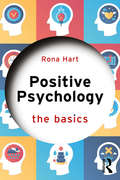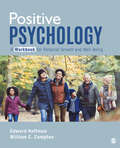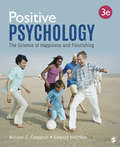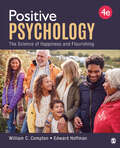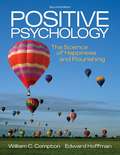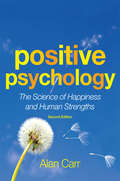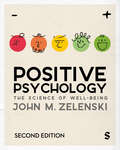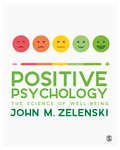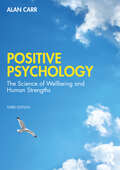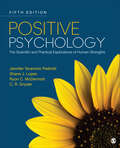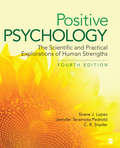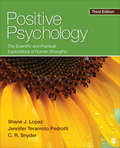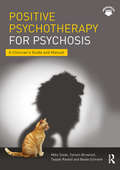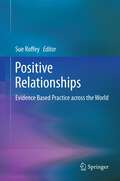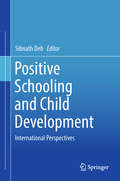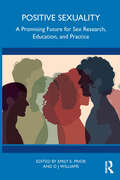- Table View
- List View
Positive Psychology: The Basics (The Basics)
by Rona HartThis book provides an accessible and balanced introduction to positive psychology scholarship and its applications, incorporating an overview of the development of positive psychology. Positive Psychology: The Basics delineates positive psychology’s journey as a discipline, takes stock of its achievements and provides an updated overview of its core topics, exploring the theory, research and interventions in each. Launched as a rebellious discipline just over two decades ago, positive psychology challenged the emphasis of applied psychology on disease and dysfunction and offered a new, more balanced perspective on human life. From its foundations in the late 20th century to recent "second-wave" theories around the importance of recognizing negative emotions, this compact overview covers the key ideas and principles, from research around emotional wellbeing, optimism and change, to posttraumatic growth and positive relationships. The first jargon-free introduction to the subject, Hart introduces the reader to a range of issues, including self-regulation and flow, character strengths and virtues and positive relationships, concluding with a chapter on how interventions can affect happiness and wellbeing. Positive Psychology: The Basics is an essential resource for students, practitioners, academics and anyone who is interested in understanding the essence of a life well lived.
Positive Psychology: The Science Of Happiness And Flourishing
by Dr Edward L. Hoffman Dr William C. ComptonEdward Hoffman and William C. Compton’s Positive Psychology: A Workbook for Personal Growth and Well-Being offers students a wealth of different activities to make concepts in positive psychology come alive. Based on scientific, psychological research that supports learning, activities include self-reflection and interviews with the reader’s family and friends. The workbook can be used with the core text written by the same authors, Positive Psychology: The Science of Happiness and Flourishing, Third Edition, or as a supplement to other core texts.
Positive Psychology: The Science Of Happiness And Flourishing
by Dr Edward L. Hoffman Dr William C. ComptonEdward Hoffman and William C. Compton’s Positive Psychology: A Workbook for Personal Growth and Well-Being offers students a wealth of different activities to make concepts in positive psychology come alive. Based on scientific, psychological research that supports learning, activities include self-reflection and interviews with the reader’s family and friends. The workbook can be used with the core text written by the same authors, Positive Psychology: The Science of Happiness and Flourishing, Third Edition, or as a supplement to other core texts.
Positive Psychology: The Science of Happiness and Flourishing
by Dr Edward L. Hoffman Dr William C. ComptonTopically organized, Positive Psychology: The Science of Happiness and Flourishing presents a highly engaging, up-to-date introduction to positive psychology. Authors William C. Compton and Edward Hoffman invite students to apply practices to their own lives, contexts, and experiences to ensure understanding. The text examines how positive psychology applies to stressors and health within such traditional research areas as developmental, clinical, personality, motivational, social, and behavioral psychology. Furthermore, the text offers perspectives on positive emotional states, research and theory on positive traits, coverage of positive institutions, and a look at the future of positive psychology. The Third Edition reflects significant growth in field with hundreds of new references and expanded content on topics including mindfulness, money and subjective well-being, and romantic love.
Positive Psychology: The Science of Happiness and Flourishing
by Dr Edward L. Hoffman Dr William C. ComptonTopically organized, Positive Psychology: The Science of Happiness and Flourishing presents a highly engaging, up-to-date introduction to positive psychology. Authors William C. Compton and Edward Hoffman invite students to apply practices to their own lives, contexts, and experiences to ensure understanding. The text examines how positive psychology applies to stressors and health within such traditional research areas as developmental, clinical, personality, motivational, social, and behavioral psychology. Furthermore, the text offers perspectives on positive emotional states, research and theory on positive traits, coverage of positive institutions, and a look at the future of positive psychology. The Third Edition reflects significant growth in field with hundreds of new references and expanded content on topics including mindfulness, money and subjective well-being, and romantic love.
Positive Psychology: The Science of Happiness and Flourishing
by William C. Compton Edward L. HoffmanPositive Psychology: The Science of Happiness and Flourishing offers students an up-to-date and contemporary introduction to the field of positive psychology. Topically organized, authors William C. Compton and Edward Hoffman examine how Positive Psychology relates to stressors and health, within such traditional research areas as developmental, clinical, personality, motivational, social, and behavioral psychology. Updates to the Fourth Edition include new material on the spread of positive psychology around the world and expanded coverage on character strengths, emotional intelligence, leisure, and the biology of positive emotions. Included with this title: LMS Cartridge: Import this title’s instructor resources into your school’s learning management system (LMS) and save time. Don’t use an LMS? You can still access all of the same online resources for this title via the password-protected Instructor Resource Site. Learn more.
Positive Psychology: The Science of Happiness and Flourishing
by William C. Compton Edward L. HoffmanPositive Psychology: The Science of Happiness and Flourishing offers students an up-to-date and contemporary introduction to the field of positive psychology. Topically organized, authors William C. Compton and Edward Hoffman examine how Positive Psychology relates to stressors and health, within such traditional research areas as developmental, clinical, personality, motivational, social, and behavioral psychology. Updates to the Fourth Edition include new material on the spread of positive psychology around the world and expanded coverage on character strengths, emotional intelligence, leisure, and the biology of positive emotions. Included with this title: LMS Cartridge: Import this title’s instructor resources into your school’s learning management system (LMS) and save time. Don’t use an LMS? You can still access all of the same online resources for this title via the password-protected Instructor Resource Site. Learn more.
Positive Psychology: The Science of Happiness and Flourishing (2nd Edition)
by Edward Hoffman William C. ComptonThis brief paperback presents in-depth coverage of the relatively new area of positive psychology. Topically organized, it looks at how positive psychology relates to stresses and health within such traditional research areas as developmental, clinical, personality, motivational, social, and behavioral psychology.
Positive Psychology: The Science of Happiness and Human Strengths
by Alan CarrRemediating deficits and managing disabilities has been a central preoccupation for clinical psychologists. Positive Psychology, in contrast, is concerned with the enhancement of happiness and well-being, involving the scientific study of the role of personal strengths and positive social systems in the promotion of optimal wellbeing. Alan Carr's Positive Psychology has become essential reading for anyone requiring a thorough and accessible introduction to the field. This new edition retains all the features that made the first edition so popular, including: accounts of major theories and relevant research learning objectives chapter summaries research and personal development questions suggestions for further reading measures for use in research glossaries of new terms. The book has also been completely updated to take account of recent research and major advances, and includes a new chapter on Positive Psychotherapy, an extended account of research on character strengths and virtues, and a discussion of recent ground-breaking research on emotional intelligence. This new edition of Positive Psychology will prove a valuable resource for psychology students and lecturers, as well as those involved in postgraduate training in related areas such as clinical psychology, social work, counselling and psychotherapy.
Positive Psychology: The Science of Well-Being
by John M. ZelenskiJohn Zelenski’s unique storytelling approach provides a broad and engaging introduction to positive psychology. Strongly guided by empirical work, and reviewing the lessons learned since the founders’ original vision of the field, this text encourages you to think critically and to look to the future by exploring positive psychology’s potential to inform social change. The second edition has been thoroughly updated to reflect the latest research, with more cross-cultural coverage and a substantial new section on meaning in life and how to find it. It also emphasizes how the science of well-being can be applied to our own lives and to the well-being of entire societies, through ‘Application’ boxes describing how positive psychology is used in the real world and ‘Try It’ exercises giving you the chance to try out theories and practices for yourself! John Zelenski is a Professor of Psychology at Carleton University in Ottawa, Canada.
Positive Psychology: The Science of Well-Being
by John M. ZelenskiJohn Zelenski’s unique storytelling approach provides a broad and engaging introduction to positive psychology. Strongly guided by empirical work, and reviewing the lessons learned since the founders’ original vision of the field, this text encourages you to think critically and to look to the future by exploring positive psychology’s potential to inform social change. The second edition has been thoroughly updated to reflect the latest research, with more cross-cultural coverage and a substantial new section on meaning in life and how to find it. It also emphasizes how the science of well-being can be applied to our own lives and to the well-being of entire societies, through ‘Application’ boxes describing how positive psychology is used in the real world and ‘Try It’ exercises giving you the chance to try out theories and practices for yourself! John Zelenski is a Professor of Psychology at Carleton University in Ottawa, Canada.
Positive Psychology: The Science of Well-Being
by John ZelenskiPositive Psychology brings together a range of research and a comprehensive review of the more recent work and lessons learned since the founder&’s original vision of this field. Organised into five sections: An Introduction, Positive Experiences, Personality Processes, External Influences, and Applications, this text provides a thorough introduction to an interesting and challenging area in Psychology. With a final look at the future of Positive Psychology, and its potential to inform social change and how useful this knowledge can be when considering the well-being of entire societies, this text is an enlightening read and invaluable resources for students. Strongly guided by empirical work this text encourages the reader to think critically and go beyond the facts. Key features: Provides a framework for teaching and understanding global trends in Positive Psychology. Inclusion and a review of up-to-date research. Using storytelling and happiness&’s intrinsic appeal to foster interest in the methods we use to answer important questions in Positive Psychology. Online resources including student self-tests, an instructor test bank, and links to additional web content.
Positive Psychology: The Science of Well-Being
by John ZelenskiPositive Psychology brings together a range of research and a comprehensive review of the more recent work and lessons learned since the founder&’s original vision of this field. Organised into five sections: An Introduction, Positive Experiences, Personality Processes, External Influences, and Applications, this text provides a thorough introduction to an interesting and challenging area in Psychology. With a final look at the future of Positive Psychology, and its potential to inform social change and how useful this knowledge can be when considering the well-being of entire societies, this text is an enlightening read and invaluable resources for students. Strongly guided by empirical work this text encourages the reader to think critically and go beyond the facts. Key features: Provides a framework for teaching and understanding global trends in Positive Psychology. Inclusion and a review of up-to-date research. Using storytelling and happiness&’s intrinsic appeal to foster interest in the methods we use to answer important questions in Positive Psychology. Online resources including student self-tests, an instructor test bank, and links to additional web content.
Positive Psychology: The Science of Wellbeing and Human Strengths
by Alan CarrThe third edition of Positive Psychology is an accessible introduction to this rapidly growing field. It covers all major positive psychology topics including wellbeing, character strengths, optimism, gratitude, savouring, flow, mindfulness, emotional intelligence, creativity, giftedness, wisdom, growth mindset, grit, self-esteem, self-efficacy, adaptive defence mechanisms, functional coping strategies, positive relationships, and positive psychology interventions. Positive Psychology retains all of the features that made previous editions so popular, including: • Learning objectives • Accounts of major theories • Reviews of relevant research • Self-assessment questionnaires • Self-development exercises • Chapter summaries • Key term definitions • Research questions for student projects • Essay questions for student assignments • Personal development questions for student exercises • Relevant web material • Further reading This new edition has been completely updated to take account of the exponential growth of research in the field. It will prove a valuable resource for students and faculty in psychology and related disciplines including social work, nursing, teaching, counselling, and psychotherapy. This edition also provides access to online teaching resources.
Positive Psychology: The Science of Wellbeing and Human Strengths
by Alan CarrThe third edition of Positive Psychology is an accessible introduction to this rapidly growing field.It covers all major positive psychology topics including wellbeing, character strengths, optimism, gratitude, savouring, flow, mindfulness, emotional intelligence, creativity, giftedness, wisdom, growth mindset, grit, self-esteem, self-efficacy, adaptive defence mechanisms, functional coping strategies, positive relationships, and positive psychology interventions. Positive Psychology retains all of the features that made previous editions so popular, including:• Learning objectives• Accounts of major theories• Reviews of relevant research• Self-assessment questionnaires• Self-development exercises• Chapter summaries• Key term definitions• Research questions for student projects• Essay questions for student assignments• Personal development questions for student exercises• Relevant web material• Further readingThis new edition has been completely updated to take account of the exponential growth of research in the field. It will prove a valuable resource for students and faculty in psychology and related disciplines including social work, nursing, teaching, counselling, and psychotherapy.This edition also provides access to online teaching resources at https://www.ucd.ie/psychology/resources/positive_psychology_carr/.
Positive Psychology: The Scientific and Practical Explorations of Human Strengths
by Shane J. Lopez Charles Richard Snyder Jennifer Teramoto Pedrotti Ryon C. McDermottPositive Psychology: The Scientific and Practical Explorations of Human Strengths offers comprehensive coverage of the science and application of positive emotions and human strengths such as empathy, altruism, gratitude, attachment, and love. Authors Jennifer Teramoto Pedrotti, Shane J. Lopez, Ryon C. McDermott, and C. R. Snyder bring positive psychology to life for students by showing how it can improve all phases of contemporary life. The fully revised Fifth Edition explores new examples and reflections on current events, new and emerging scholarship in the field, expanded coverage of the neurological and biological foundations of positive psychology, and a new focus on the diverse aspects of our society and the many strengths rooted in our multi-faceted cultures. Included with this title: LMS Cartridge: Import this title’s instructor resources into your school’s learning management system (LMS) and save time. Don’t use an LMS? You can still access all of the same online resources for this title via the password-protected Instructor Resource Site. Learn more.
Positive Psychology: The Scientific and Practical Explorations of Human Strengths
by Shane J. Lopez Charles Richard Snyder Jennifer Teramoto Pedrotti Ryon C. McDermottPositive Psychology: The Scientific and Practical Explorations of Human Strengths offers comprehensive coverage of the science and application of positive emotions and human strengths such as empathy, altruism, gratitude, attachment, and love. Authors Jennifer Teramoto Pedrotti, Shane J. Lopez, Ryon C. McDermott, and C. R. Snyder bring positive psychology to life for students by showing how it can improve all phases of contemporary life. The fully revised Fifth Edition explores new examples and reflections on current events, new and emerging scholarship in the field, expanded coverage of the neurological and biological foundations of positive psychology, and a new focus on the diverse aspects of our society and the many strengths rooted in our multi-faceted cultures. Included with this title: LMS Cartridge: Import this title’s instructor resources into your school’s learning management system (LMS) and save time. Don’t use an LMS? You can still access all of the same online resources for this title via the password-protected Instructor Resource Site. Learn more.
Positive Psychology: The Scientific and Practical Explorations of Human Strengths (Praeger Perspectives Ser. #7)
by Jennifer Teramoto Pedrotti Dr Shane J. Lopez Charles Richard SnyderPositive Psychology: The Scientific and Practical Explorations of Human Strengths comprehensively covers the science and application of positive psychology. Authors Shane J. Lopez, Jennifer Teramoto Pedrotti, and C. R. Snyder bring positive psychology to life by illustrating issues such as how psychological strength can help increase positive outcomes in school and the workplace and promote cooperative relationships among people. Furthermore, the book encourages readers to engage with concepts in order to understand positive emotions and strengths, such as empathy, altruism, gratitude, attachment, and love. Over 50 case studies grounded in practice, research, and the authors’ teaching experience reveal how positive psychological phenomena operate in the lives of real people.
Positive Psychology: The Scientific and Practical Explorations of Human Strengths (Praeger Perspectives Ser. #7)
by Jennifer Teramoto Pedrotti Dr Shane J. Lopez Charles Richard SnyderPositive Psychology: The Scientific and Practical Explorations of Human Strengths comprehensively covers the science and application of positive psychology. Authors Shane J. Lopez, Jennifer Teramoto Pedrotti, and C. R. Snyder bring positive psychology to life by illustrating issues such as how psychological strength can help increase positive outcomes in school and the workplace and promote cooperative relationships among people. Furthermore, the book encourages readers to engage with concepts in order to understand positive emotions and strengths, such as empathy, altruism, gratitude, attachment, and love. Over 50 case studies grounded in practice, research, and the authors’ teaching experience reveal how positive psychological phenomena operate in the lives of real people.
Positive Psychology: The Scientific and Practical Explorations of Human Strengths (Praeger Perspectives Ser.)
by Jennifer Teramoto Pedrotti Dr Shane J. Lopez Charles Richard SnyderThe fully updated Third Edition of Positive Psychology: The Scientific and Practical Explorations of Human Strengths covers the science and application of positive psychology and presents new frameworks for understanding positive emotions and strengths through a culturally competent lens. Authors Shane J. Lopez, Jennifer Teramoto Pedrotti, and C.R. Snyder bring positive psychology to life by addressing important issues such as how positive psychology can improve schooling and the workplace, as well as how it can promote flourishing in day-to-day life. Throughout the book, well-crafted exercises allow readers to apply major principles to their own lives. The book also explores various positive conditions within multiple cultural contexts, such as happiness and well-being, and processes related to mindfulness, wisdom, courage, and spirituality. “The emphasis is not exclusively clinical; it includes applications and implications across a number of environments and draws from a number of perspectives, including neurobiology. This range makes it an excellent choice for anchoring major concepts so students can explore the application of positive psychology to their specific areas of interest.” —Dr. Pamela Rutledge, Massachusetts School of Professional Psychology
Positive Psychology: The Scientific and Practical Explorations of Human Strengths (Praeger Perspectives Ser.)
by Jennifer Teramoto Pedrotti Dr Shane J. Lopez Charles Richard SnyderThe fully updated Third Edition of Positive Psychology: The Scientific and Practical Explorations of Human Strengths covers the science and application of positive psychology and presents new frameworks for understanding positive emotions and strengths through a culturally competent lens. Authors Shane J. Lopez, Jennifer Teramoto Pedrotti, and C.R. Snyder bring positive psychology to life by addressing important issues such as how positive psychology can improve schooling and the workplace, as well as how it can promote flourishing in day-to-day life. Throughout the book, well-crafted exercises allow readers to apply major principles to their own lives. The book also explores various positive conditions within multiple cultural contexts, such as happiness and well-being, and processes related to mindfulness, wisdom, courage, and spirituality. “The emphasis is not exclusively clinical; it includes applications and implications across a number of environments and draws from a number of perspectives, including neurobiology. This range makes it an excellent choice for anchoring major concepts so students can explore the application of positive psychology to their specific areas of interest.” —Dr. Pamela Rutledge, Massachusetts School of Professional Psychology
Positive Psychotherapy for Psychosis: A Clinician's Guide and Manual
by Mike Slade Tamsin Brownell Tayyab Rashid Beate SchrankPositive Psychotherapy for Psychosis describes a new psychological intervention, which for the first time applies emerging research from the field of positive psychology specifically to psychosis. The book contains guidance on adapting the approach for use in individual treatments, and on providing part of the intervention, either as individual sessions or by integrating Positive Psychotherapy for Psychosis sessions into other treatments. Divided into two sections – Theory and the Intervention Manual – this book offers methodologically rigorous research, case studies and detailed aims and instructions for clinicians and therapists. The structured, step-by-step manual, for use with clients, includes downloadable handouts, session materials, activities, guides and therapist tips. The manual will be a practical, positive and innovative resource for mental health professionals, providing all the material needed to deliver this evidence-based approach that is designed to improve wellbeing and reduce symptoms experienced by people living with psychosis. Positive Psychotherapy for Psychosis will be of interest to mental health clinicians working with people with psychosis, as well as clinical and counselling psychologists, psychiatrists, mental health nurses, psychotherapists, social workers, occupational therapists, support workers and peer support specialists.
Positive Relationships
by Sue RoffeyRelationships are at the heart of our lives; at home with our families, with our friends, in schools and colleges, with colleagues at the workplace and in our diverse communities. The quality of these relationships determines our individual well-being, how well we learn, develop and function, our sense of connectedness with others and the health so society. This unique volume brings together authorities from across the world to write about how relationships might be enhanced in all these different areas of our lives. It also explores how to address the challenges involved in establishing and maintaining positive relationships. This evidence-based book, primarily grounded in the science of positive psychology, is valuable for academics, especially psychologists and professionals, working in the field of well-being.
Positive Schooling and Child Development: International Perspectives
by Sibnath DebThis volume discusses the importance of positive schooling in producing responsible and potentially productive adults. Students are generally more motivated to do well and to realize their full potential in schools that have a positive schooling climate, where they feel safe, included and supported. Nevertheless, the reality in today's schools is very different. This volume discusses the major challenges faced by children and adolescents in schools, including problems with curricula, safety issues, lack of inclusive policies, non-availability of teachers, ineffective teaching, insensitivity towards students’ issues, improper evaluation methods, harmful disciplinary measures, and so on. Experts in child psychology and education discuss these issues at length in this volume and offer viable solutions for policymakers, school administrators, teachers and parents to make suitable changes and create a positive atmosphere in educational institutions. This volume further discusses the role of various stakeholders---school principals, teachers, counsellors and psychologists---in addressing these challenges. In addition, it raises other, emerging issues which have not been covered in previous volumes on this topic and offers evidence-based suggestions to address them. The intended readership of the volume is researchers and students of psychology, education, sociology, social work and public health, and school teachers, administrators and teacher-trainers.
Positive Sexuality: A Promising Future for Sex Research, Education, and Practice
by D J Williams Emily E. PriorThis book focuses on an emerging, multidisciplinary, positive sexuality framework that guides sexuality research, education, and practice.Using this positive sexuality framework, this book will provide helping professionals and others with current research and information on topics and populations that are often missed or misrepresented, including but not limited to: lesbian, gay, bisexual, asexual, and other orientations; transgender, nonbinary, and other non-cisgender identities; seniors; sex workers; racial minorities; and other marginalized peoples. This framework, based on the social and behavioral sciences, can be used in tandem with other theoretical frameworks, modalities, and methodologies to better support a growing, multifaceted, and unique human population. Chapters are authored by topic experts and utilize the most recent scholarship pertaining to positive sexuality. Readers will come to understand diverse sexuality more completely and inextricably linked to other parts of one’s identity and learn to address diverse sexual topics and issues more openly and with a spirit of compassion and human connectedness.This edited volume is a must-read for sexuality researchers, clinicians, helping professionals, policymakers, and students from diverse educational backgrounds who are interested in human sexuality.
